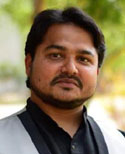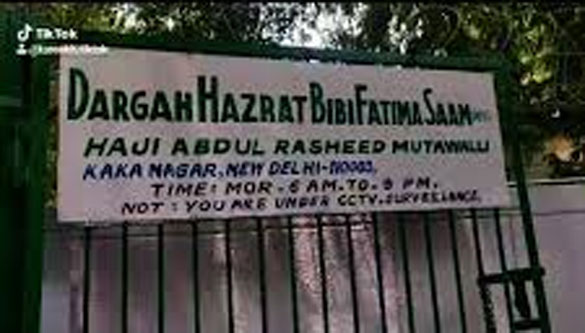Do You Know ‘Rabia of Delhi’—Bibi Fatima Sam Popularly Known as “Dilli Ki Rabia”?

By Ghulam Rasool
Dehlvi, New Age Islam
22 July
2024
What Kind of Heart Is That Which Is Not Familiar with The Ecstasy and
Pleasures of Divine Love? And What Sort of Life Is a Life That Does Not Benefit
the Creations of God?
Bibi Fatima Sam (RA)
------

In every era, some special servants of God—whom I call the "Divine Lovers"—detached from the mundane worldly affairs, baser and selfish instincts, divorced from the prevailing political turmoil, removed from the hue and cry of competitive social life and far away from materialistic indulgences, are deeply engaged in unconditional devotional love and worship of the Beloved Divine Creator, while at the same time caring for all the Creations.
Among them,
the greatest example among Delhi's Chishti Sufi Sages is our very own beloved,
and Beloved of the Divine (Mahbub-e-Ilahi)
Khwaja Hazrat Nizamuddin Auliya (may Allah be pleased with him). It is a piece
of common knowledge now that he is considered the Spiritual Sultan of Delhi.
But not many know about "Rabia of
Delhi" Bibi Fatima Sam RA popularly known as "Dilli Ki Rabia". Hazrat Nizamuddin
Auliya himself used to revere her as his spiritual mentor and Baba Fariduddin
Ganj Shakkar as his "spiritual sister". Khwaja Naseeruddin Mahmood
Chiragh Dilli (also called Chiragh Dehlvi) narrates that Hazrat Nizamuddin
Awliya (RA) would undertake pilgrimages to the tomb of Bibi Fatima Sam, which
is near the enclosure of a pool. Bibi Fatima Sam originally hailed from a place
on the borders between Iraq and Iran. But her spiritual search and an inner
urge eventually settled down in Delhi—the city of 22 great Sufi saints, Awliya and Khwajgaan.
Today,
everyone considers the visitation of Dargah Hazrat Nizamuddin Auliya as a
blessing for him, at least once a month if he/she is in Delhi. But imagine the
visitation of the great woman Sufi's shrine which witnessed the regular
attendance and blessed presence of even the Beloved of Divine (Mahbub-e-Ilahi) himself! He would
consider visiting Bibi Fatima Sam as the unveiling of thousands of veils for
his augmentation of inner knowledge, enlightenment, and an eternal reward for
himself. Now it is not difficult to see how high this mystic Muslim woman's
place was estimated in the eyes of established Awliya like Baba Farid and his
close disciples in the Chishtiyya
lineage.
This is the
tale of the great Sufi woman of her time who was venerated by many male and
female saints as Murshida (spiritual
guide or master), Abida (great
devotee and worshipper), Zahida
(ascetic), and Sufi Sha'ira (a mystic poetess) and above all, the "Rabia
of her time" originally named Hazrat Bibi Fatima Sam (may Allah have mercy
on her). She is also known as 'Rabia of Delhi' and Rabia Dehlvi. A deep, simple
and sober woman mystic, Bibi never flaunted her saintliness. Therefore, she was
endeared by many saints including Baba Farid and his brother Khwaja Mutawakkil
and Hazrat Nizamuddin Aulia. All of them held her in high esteem.
During the
dynasty of Sultan Iltutmish, numerous Sufis, poets, scholars and Muslim mystics
from Arabia and Central Asia gathered in Delhi in great numbers. Devotees
thronged to them. Many of them had great ties with the Sultan. In the historic
city of Delhi in that period, a dervish woman with the least craving for
worldly power or limelight was silently and discreetly emerging among them.
With a lofty position that was beyond their comprehension, her spiritual
intellect and Firasat-e-Mo'mina
(insight of a true believer) were unmatched and unprecedented. Sitting often on
her prayer mat, with an inner flame of divine love, she was inseparably
connected to her only Almighty Lord, with complete detachment from the Sultan
and politics.
One thing
had settled in her heart that life was incomplete without igniting one's mind
and soul with Ishq-e-Ilahi (Divine Love). With the light and Noor of this
certitude (Ilm-Ul-Yaqeen), she
sought, spoke and spread the same truth to the last breath of her God-conscious
life.
It never
happened that the moon of a new month was seen, and the dervish woman was not
found fasting. A maid used to keep two loaves of bread and a cup of water near
her Musalla/prayer mat at sunset. But
the pain of seeing the poor all around her would not allow her to feed herself
if even a single person slept hungry in her neighbourhood. And when the bread
sent by Bibi Fatima Sam would reach another dervish in the vicinity of her
Khanqah, he would look up at heaven and invoke:
O Allah the Almighty!
Bestow the light (Noor) and
intellect (Aql) like this woman
dervish possess, to our emperor so that he may also be aware of the condition
of the poor like us. Then he would smile and say: “Alas! The sultans do not
possess that inward cleanliness; by which they may be acquainted with our
condition”.
From this
spiritual ambiance and blissful atmosphere in Delhi of those days, which was
created by Baba Farid, Bibi Fatima Sam, Hazrat Nizamuddin Awliya and their
Chishti caliphs, a garden of spirituality, sincerity, and purity of heart was
blossoming and flourishing in every corner of the city. Late Sadia Dehlvi, an
acclaimed author on Delhi’s Sufi saints notes in her book “The Sufi Courtyard: Dargahs of Delhi”: Bibi Fatima Sam (who died on
17 Shaban 644 Hijri/1246 AD) is called the Rabia of Delhi, after Rabia of
Basra, the famous mystic of the eighth century.
Renowned
writer and historian Rana Safvi, author of “Where Stones Speak – The Delhi Trilogy” and translator of “City of my Heart” says:
“Not much is known about Bibi Fatima Sam except that she was the adopted
sister of Baba Farid and her Dargah in midst of the residential area of Kakanagar
is an oasis of peace”.
Bibi Fatima
Sam reposed great faith in Hazrat Najeebuddin Mutawakkil—a brother of Baba
Farid Ganj Shakkar and a great saint of the era, she writes. Mutawakkil treated
Fatima Sam as his sister. When there was nothing in the house to eat, it was
Bibi Fatima who used to send him some bread.
Rana Safvi
recounts some related stories in her blog which is a repository of her writings
especially on Delhi’s cultural heritage and the city’s famous Sufi mystics. She
tells us an enchanting account of her visit to the tomb of Bibi Fatima Sam:
“The Mutawalli (custodian) of the Dargah
Bibi Fatima Sam very patiently answered all my questions about the Bibi. I saw
a few people praying there and I too wanted to pray. I was a bit apprehensive
as there was only one room with the main shrine and most Mutawallis (shrine custodians) have reservations about women. He
very politely told me to pray in the corner of the room hidden from view by the
shrine so I would not be disturbed. I am glad that at least in a Dargah of a lady, ladies are respected
and treated at par.”
This writer
also made several visits to the calm and composed shrine of the Bibi which
exhumes serenity and solace in Delhi's Kaka Nagar. Despite all her regular
invocations, daily prayers, Ibadat and Riyazat, the exceptional eminence of
this woman mystic was that flowing Persian poetry would come to her naturally.
She was a Sufi poet par excellence. Rhymes filled with Ishq-e-Elahi and
devotional love for God would bring tears to all those sitting in her divine
presence when she would recite some of her couplets in extempore. Look at his
nuanced piece from her Persian poetry:
ہم عِشق طلب کنی، وہم جَاں خواہی
ہَر دو طلبی وَلے میسّر نہ شود
Translation:
You ask for
divine love and at the same safety of your life,
These two
desires cannot be achieved together!
Tales of
the great spiritual place and prominence of this first saint of Delhi—Bibi
Fatima Sam, also known as Rabia Dehlvi or " Dilli Ki Rabi’a" are also recorded in some Sufi discourses and
documents. What is most worth mentioning
is that Hazrat Baba Farid used to say that "the worship of this single
woman is equal to ten perfect saintly men (Awliya-e-Kamilin)."
According to Hazrat Amir Khurd Kirmani R.A: " At the beginning of the 14th
century AD, it was a sign of her overwhelming acceptance that the Dargah of
Hazrat Bibi Fatima Sam (Rahmatullah
Alaiha) was seen as the Qiblah of
all godly men."
The Dargah
of Bibi Fatima Sam (r.a) is located in Kaka Nagar near Khan Market in Delhi.
The biography of Bibi Fatima remains rather undiscovered and her life is not
detailed. But from what is recorded about her in oral transmissions among the Awliya of Delhi, one can easily reckon
her lofty spiritual position and unwavering passion for serving God and
Mankind. In fact, not only among the Sufi women but also godly men and Awliya of early times, her persona was a
beautiful confluence of Khidmat
(social service and humanitarian work) as well as Ibadat (servitude to God), which was difficult to find an example
of. She was frequently mentioned not just in the Khankas of Delhi. Rather, her fame spread far and wide from
Ajodahan to Gulbarga—where Sufi saints used to gather. If the life and legacy
of Delhi’s Rabia are summed up in two sentences, it goes in her own words as
follows:
“The saints
will cast away both material and spiritual blessings to give a piece of bread
or a drink of water to someone in need. This state is something one cannot
obtain by one hundred thousand fasts and prayers.”
------
A
Regular Columnist with Newageislam.com, Ghulam Rasool Dehlvi is an Indo-Islamic
scholar, Sufi poet and English-Arabic-Urdu-Hindi writer with a background in a
leading Sufi Islamic seminary in India. He is currently serving as Head of
International Affairs at Voice for Peace & Justice, Jammu & Kashmir.
URL: https://www.newageislam.com/islamic-personalities/rabia-delhi-bibi-fatima-sam-dilli-rabia/d/132757
New Age Islam, Islam Online, Islamic Website, African Muslim News, Arab World News, South Asia News, Indian Muslim News, World Muslim News, Women in Islam, Islamic Feminism, Arab Women, Women In Arab, Islamophobia in America, Muslim Women in West, Islam Women and Feminism
